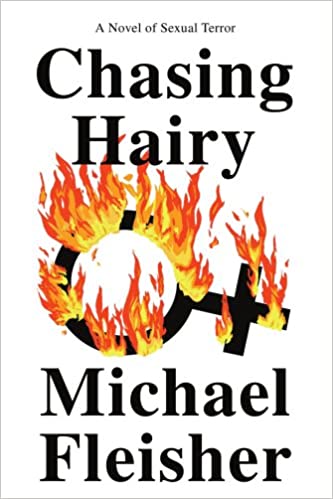 By MICHAEL FLEISHER (iUniverse; 1979/2007)
By MICHAEL FLEISHER (iUniverse; 1979/2007)
I’ll be sure and watch my language when describing CHASING HAIRY. It was used as evidence, after all, in its author Michael Fleisher’s famous lawsuit against Harlan Ellison, who according to Fleisher libelously described him as (among other things) “twisted,” “derange-o” and “bugfuck” in a 1979 Comics Journal interview, in which Ellison further alleged (wrongly) that a Publisher’s Weekly reviewer called this novel “the product of a sick mind.”
Sick? That may be taking things a bit too far, but CHASING HAIRY is a profoundly cynical, profane and, in its final pages, quite gory novel that’s been compared to AMERICAN PSYCHO. More accurate reference points would be CARNAL KNOWLEDGE—or at least a far rawer, less compromising version of same—and Michael Blodgett’s lacerating 1979 novel CAPTAIN BLOOD, which like CHASING HAIRY offered a quintessentially seventies depiction of sexual aggression and skewed morality. But let’s get back to CHASING HAIRY’S finale, which is nasty enough to irretrievably color everything that came before; some reviewers claim the novel is “about” what happens in its concluding pages, an event that nudges a more-or-less straightforward drama into genre territory.
Not that there aren’t hints of the horror to come early on in the book, when we’re introduced to the unassuming first person protagonist Simon and his wild college pal Ken Pederson. The latter is attractive to Simon primarily because of his skill in procuring “hairy,” Pederson’s term for vagina (as in “I could never love a woman who didn’t have a big bushy hairy”). It’s clear from the start, however, that Pederson is a true blue nutcase; he suffered a severe nervous breakdown prior to starting college, and now deflects his anger and disillusionment onto the opposite sex.
Simon and Pederson remain friends over the following years, during which Simon marries Heather, an alluring black woman to whom Pederson never misses a chance to make a racial slur. Pederson also settles down (sort of) with a young woman he knocks up. His attitude to fatherhood is much in keeping with his overall worldview: “All you do is just go off to work in the morning and when you come home at night you give them a little pat on the head. The women do all the hard parts.” What Pederson doesn’t count on is the animosity he faces from his shrewish mother-in-law, and he shocks everyone by injuring the old woman in a burst of rage-fueled violence that lands him in prison.
Simon, meanwhile, has female trouble of his own. After a few years of marriage he and Heather drift apart, to which she reacts by attacking him with a steak knife and then asphyxiating herself. Hence, Simon and Pederson are both quite traumatized by the time the latter is released from prison. Pederson at this point appears to have a much steadier, more measured outlook than before, bequeathed by his psychiatrist mother. Yet Pederson remains the sexist asshole he always was, as he demonstrates when he and Simon pick up a hitchhiker one evening, and Pederson’s sexual aggressiveness rears its ugly head…
Certainly Pederson is a vile individual, but so is the less aggressive Simon, who gleefully screws around on his wife and, during a hospital visit to view Pederson’s newborn son, is more interested in ogling the attending nurse’s enormous tits. Yet the exploits of these two assholes are compelling nonetheless, due largely to a robust and unpretentious prose style that overflows with graphic carnality and a subtle but ominous air of impending menace.
